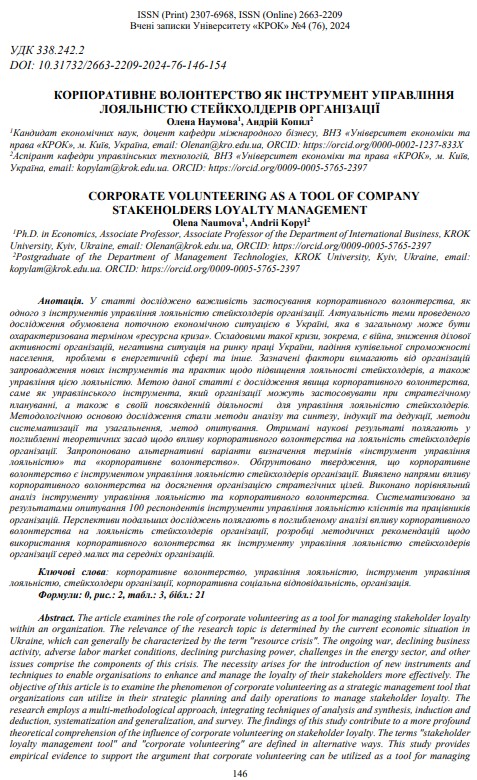CORPORATE VOLUNTEERING AS A TOOL OF СOMPANY STAKEHOLDERS LOYALTY MANAGEMENT
DOI:
https://doi.org/10.31732/2663-2209-2024-76-146-154Keywords:
corporate volunteering, loyalty management, loyalty management tool, organization's stakeholders, corporate social responsibility, organizationAbstract
The article examines the role of corporate volunteering as a tool for managing stakeholder loyalty within an organization. The relevance of the research topic is determined by the current economic situation in Ukraine, which can generally be characterized by the term "resource crisis". The ongoing war, declining business activity, adverse labor market conditions, declining purchasing power, challenges in the energy sector, and other issues comprise the components of this crisis. The necessity arises for the introduction of new instruments and techniques to enable organisations to enhance and manage the loyalty of their stakeholders more effectively. The objective of this article is to examine the phenomenon of corporate volunteering as a strategic management tool that organizations can utilize in their strategic planning and daily operations to manage stakeholder loyalty. The research employs a multi-methodological approach, integrating techniques of analysis and synthesis, induction and deduction, systematization and generalization, and survey. The findings of this study contribute to a more profound theoretical comprehension of the influence of corporate volunteering on stakeholder loyalty. The terms "stakeholder loyalty management tool" and "corporate volunteering" are defined in alternative ways. This study provides empirical evidence to support the argument that corporate volunteering can be utilized as a tool for managing stakeholder loyalty. The article identifies the ways in which corporate volunteering affects the achievement of an organization's strategic goals. It also conducts comparative analysis of stakeholder loyalty management tools and corporate volunteering. Based on a survey of 100 respondents, this study systematizes loyalty management tools for organizational clients and employees. Further research could yield valuable insights by undertaking a more comprehensive examination of the influence of corporate volunteering on stakeholder allegiance, and by formulating methodological guidelines for leveraging corporate volunteering as a strategy for managing stakeholder loyalty in small and medium-sized organizations.
Downloads
References
Alfes, K., Antunes, B., & Shantz, A. D. (2016). The management of volunteers – what can human resources do? A review and research agenda. The International Journal of Human Resource Management, 28(1), 62–97. https://doi.org/10.1080/09585192.2016.1242508
Ashfaq, F., Butt, M., & Ilyas, S. (2020). Volunteering: what drives and retains it? An analysis of motivational needs together with organizational policies and practices. Qualitative Research Journal, 21(2), 189–205. https://doi.org/10.1108/QRJ-04-2020-0024
Brzustewicz, P., Escher, I., Hatami, A., Hermes, J., Keränen, A., & Ulkuniemi, P. (2022). Emergence of social impact in company–NGO relationships in corporate volunteering. Journal of Business Research, 140, 62-75. https://doi.org/10.1016/j.jbusres.2021.11.089
Business for Better Leadership Report. (2019). Seven practices of effective employee volunteer program. Retrieved from http://surl.li/gjdmgg
Cheah, J. S., & Lim, K. H. (2024). Effects of internal and external corporate social responsibility on employee job satisfaction during a pandemic: A medical device industry perspective. European management journal, 42(4), 584-594. https://doi.org/10.1016/j.emj.2023.04.003
Dempsey-Brench, K., & Shantz, A. (2022). Skills-based volunteering: A systematic literature review of the intersection of skills and employee volunteering. Human Resource Management Review, 32(4), 100874.. Human Resource Management Review 32 (2022) 100874. https://doi.org/10.1016/j.hrmr.2021.100874
Dreesbach-Bundy, S., & Scheck, B. (2017). Corporate volunteering: A bibliometric analysis from 1990 to 2015. Business Ethics: A European Review, 26(3), 240–256. https://doi.org/10.1111/beer.12148
Hatami, A., Hermes, J., Keränen, A., & Ulkuniemi, P. (2024). Happiness management through corporate volunteering in advancing CSR. Management Decision, 62(2), 575-590. https://doi.org/10.1108/MD-11-2022-1560
Lavelle, J. J. (2010). What motivates OCB? Insights from the volunteerism literature. Journal of Organizational Behavior, 31(6), 918-923. https://doi.org/10.1002/job.644
Rashid, N. R. N. A., Khalid, S. A., & Rahman, N. I. A. (2015). Environmental corporate social responsibility (ECSR): Exploring its influence on customer loyalty. Procedia Economics and Finance, 31, 705-713. https://doi.org/10.1016/S2212-5671(15)01159-4
Rigby, D. (2001). Management tools and techniques: A survey. California management review, 43(2), 139-160. https://doi.org/10.2307/41166079
Rodell, J. B. (2013). Finding Meaning through Volunteering: Why Do Employees Volunteer and What Does It Mean for Their Jobs? Academy of Management Journal, 56(5), 1274–1294. http://dx.doi.org/10.5465/amj.2012.0611
Sampene, A. K., Li, C., Agyeman, F. O., & Brenya, R. (2024). Employees’ behavioural action towards corporate environmental performance: The moderating effect of moral reflectiveness. Heliyon, 10(6). https://doi.org/10.1016/j.heliyon.2024.e28075
Sattayapanich, T., Janmaimool, P., & Chontanawat, J. (2022). Factors affecting community participation in environmental corporate social responsibility projects: evidence from mangrove forest management project. Journal of Open Innovation: Technology, Market, and Complexity, 8(4), 209. https://doi.org/10.3390/joitmc8040209
Sekar, S. (2021). What drives employee's involvement in corporate volunteering? Bright and dark side of consequences to organization. Benchmarking: An International Journal, 29(7), 2258-2274. https://doi.org/10.1108/BIJ-02-2021-0074
Sekar, S., & Dyaram, L. (2017). What drives employees to participate in corporate volunteering programs? Social Responsibility Journal, 13(4), 661–677. https://doi.org/10.1108/SRJ-06-2017-0097
Воронова, В. (2023). Корпоративна соціальна відповідальність як інноваційна PR технологія формування іміджу та репутації українських компаній в умовах російсько-української війни. IV Міжнародна науково-практична онлайн-конференція «Соціокомунікаційна наука в парадигмі смислових трансформацій: суспільні виклики, тренди освіти і професійної діяльності» (с. 10-21). Retrieved from http://surl.li/wfyutd
Куровська, Н. О., & Недільська, Л. В. (2022). Стратегічні напрями розвитку соціальної відповідальності бізнесу. Бізнес Інформ, 5, 69–74. https://doi.org/10.32983/2222-4459-2022-5-69-74
Неткова, В. М. (2017). Процес управління лояльністю: теоретичні основи та практичні аспекти. Економіка і суспільство, 8, 313-320. https://economyandsociety.in.ua/journals/8_ukr/56.pdf
Сталість українського бізнесу під час війни: що показав «Індекс КСВ 2023». (2023). Retrieved from http://surl.li/xgjysy
Устік, Т., & Колодненко, Н. (2024). Запровадження маркетингових інструментів для підвищення лояльності клієнтів. Herald of Khmelnytskyi National University. Economic Sciences, 326(1), 208-214. https://doi.org/10.31891/2307-5740-2024-326-34

Downloads
Published
How to Cite
Issue
Section
License

This work is licensed under a Creative Commons Attribution-NonCommercial 4.0 International License.

